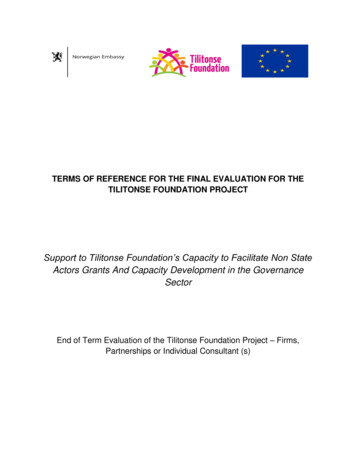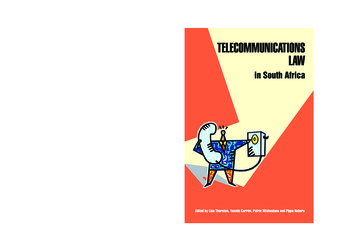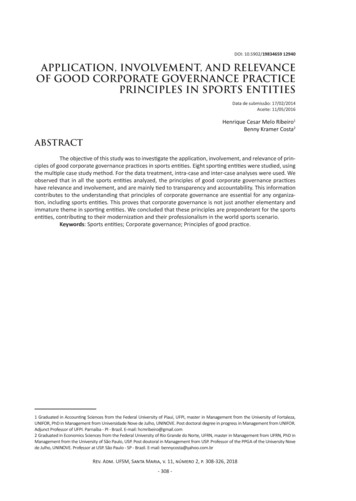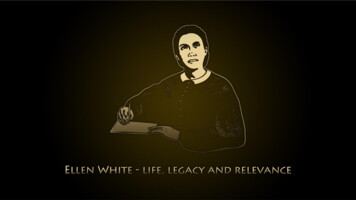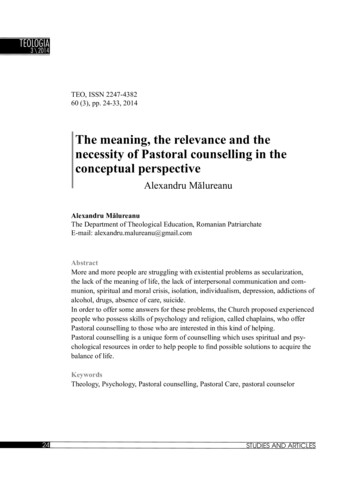
Transcription
TEOLOGIA3 \ 2014TEO, ISSN 2247-438260 (3), pp. 24-33, 2014The meaning, the relevance and thenecessity of Pastoral counselling in theconceptual perspectiveAlexandru MălureanuAlexandru MălureanuThe Department of Theological Education, Romanian PatriarchateE-mail: alexandru.malureanu@gmail.comAbstractMore and more people are struggling with existential problems as secularization,the lack of the meaning of life, the lack of interpersonal communication and communion, spiritual and moral crisis, isolation, individualism, depression, addictions ofalcohol, drugs, absence of care, suicide.In order to offer some answers for these problems, the Church proposed experiencedpeople who possess skills of psychology and religion, called chaplains, who offerPastoral counselling to those who are interested in this kind of helping.Pastoral counselling is a unique form of counselling which uses spiritual and psychological resources in order to help people to find possible solutions to acquire thebalance of life.KeywordsTheology, Psychology, Pastoral counselling, Pastoral Care, pastoral counselor24STUDIES AND ARTICLES
The meaning, the relevance and the necessity of Pastoral counselling.1. The meaning of Pastoral counselling: terminology and distinctionsbetween Pastoral counselling and Pastoral Care.TEOLOGIA3 \ 2014In post war pastoral literature (since 1920), one can find “care” and “counselling” as synonyms, “their gradual distinction reflects the emergence ofPastoral counselling as a specialized ministry”.1Pastoral counselling is a specialized type of pastoral care. Accordingto the Dictionary of Pastoral Care: “Pastoral care is a branch that derivesfrom the biblical image of shepherd and refers to the concern expressedwithin the religious community for persons in trouble or distress” and“Pastoral counselling is the utilization by clergy of counselling andpsychotherapeutic methods to enable individuals, couples and families tohandle their personal crises and problems in living constructively”.2The American Association of Pastoral Counselors (AAPC), the firstassociation of Pastoral counselling in the world (1963), describes Pastoralcounselling in its constitution as the “exploration, clarification andguidance of human life, both individual and corporate, at the experientialand behavioral levels through a theological perspective”.3The pastoral office has from its beginning a meaning of therapeuticrelationship. The most frequently used Greek word related to healing inthe New Testament is “therapeuo” (θεραπευω), that means both “to serve”the divinity and “to care for, treat (medically), heal, restore”.4“Therapeia”(θεραπεία) means in the Greek a helping, serving, healingrelationship and a “therapon” (θεράπων)is one who helps, serves andheals. The Latin translation for “therapon” is “ministerium”, from whichthe word of “minister” (helper, servant) comes.5If religious counselling and other secular therapies use particularpractices, Pastoral counselling “is identified by its representation of thecommunity that authorizes it, through a relationship to a pastor accountableDictionary of Pastoral Care and Counselling, General Editor Rodney J. Hunter, Published by Abingdon Press, Nashville, 1990, p. 849 (in this paper quoted as DPCC).2Dictionary of Pastoral Care, Edited by Alastair V. Campbell, Published by The Crossroad Publishing Company, New York, 1987, p. 198 (in this paper quoted as n-pastoral-counseling.aspx - AmericanAssociation of Pastoral Counselors (20.01.2015).4Howard Clinebell, Basic Types of Pastoral Care and Counselling–Resources for theMinistry of Healingand Growth, Publishedby SCM Press LTD, London, 1984, p. 55.5Thomas C. Oden, Pastoral Counsel, Published by Crossroad, New York, 1989, p. 7.1STUDIES AND ARTICLES25
TEOLOGIA3 \ 2014Alexandru Mălureanuto that community”,6 so it is important to understand Pastoral counsellingas “a spiritual counselling and not as a psychotherapy or therapeuticcounselling”.7A pastoral counselor is a pastor who, “as a part of his or her ministerialresponsibility, offers counselling to persons in need”.8Pastoral counselling is essentially interdisciplinary, so the pastoralcounselors “must learn to be as skilled in the methodology of psychologyas they are in that of theology”.9 Pastoral counselling combines “thetradition of pastoral work with the insights of the behavioural sciences”.10Thomas Oden, one interpreter of modern Pastoral counselling, saidthat “Scripture is the most reliable source of understanding of God’s owncaring for humanity and the world”.11According to Howard Clinebell, the first president of AAPC, therelationship between the practice of pastoral care and counselling and thebiblical heritage is like a two-way street: “the insights from the heritageilluminate, inform and guide the practice of these pastoral arts and thispractice brings to life basic biblical truths by allowing them to becomeincarnate and experienced in human relationships. In counselling, thebiblical truths are illuminated by being applied and tested in the arena ofhuman struggles and growth. So, in this sense, pastoral care and counsellingare ways of doing theology”.12Healing of sickness is a central motif in the New Testament. Theparable of Jesus about the shepherd who left the ninety-nine to find the onelost sheep shows his deep concern for the individual in need (Matthew 18,12-14)13. His response to those who criticized him for eating with sinners:“Those who are well have no need of physician, but those who are sick”DPCC, p. 850.Mary Anne Coate, Sin, Guiltand Forgiveness. The hidden dimensions of a Pastoral Process, Published by Society for Promoting Christian Knowledge, London, 1994, p. 180.8DPCC, p. 859.9Deborah van Deusen Hunsinger, Theology and Pastoral Counseling. A new Interdisciplinary approach, Published by William B. Eerdmans Publishing Company, Michigan, 1995, p. 5.10Michael Jacobs, ”Pastoral CounselingandPsychotherapy”, in: David WillowsandJohnSwinton (eds.), Spiritual Dimensions of Pastoral Care. Practical Theology in a Multidisciplinary context, Published by Jessica Kingsley Publishers, London, 2000, p. 90.11Thomas C. Oden, op. cit., p. 103.12Howard Clinebell, op. cit., p. 49.13The Holy Bible, New Revised Standard Version, Cambridge University Press, 2010.6726STUDIES AND ARTICLES
The meaning, the relevance and the necessity of Pastoral counselling.(Mark 2, 17) showed his ministry’s orientation.14 So, Pastoral counsellingis a “ministry of the church, a dimension of the church’s unified ministryin the name of Christ”15. It isa unique form of counselling which usesspiritual and psychological resources for healing the whole person: mind,body and soul.TEOLOGIA3 \ 20142. Modern elements of Pastoral counselling:Background, beginnings and developmentThomas Oden sees the roots of it in the Church Fathers16, but the historical foundations of Pastoral counselling can more clearly be seen inlater centuries.Historian Brooks Holifield presented a variety of interrelated factorsthat contributed to the emergence of the Pastoral counselling movement,as: the growing interest since about 1870 in applying psychology to thework of ministry, the flowering of psychology of religion (William James,Sigmund Freud), the increasing use of psychological and counsellinginsights after the post-World War I, the surge of interest in psychology andthe use of psychological and counselling approaches in ministry by pastorsbeginning in the 1920s.17In 1925, Doctor Richard Cabot, a physician and adjunct at HarvardDivinity School, published an article in the “Survey Graphic” suggestingthat every candidate for the ministry receive clinical training for pastoralwork similar to the clinical training offered to medical students.18In the 1930s, Reverend Anton Boisen, one of the founder of the ClinicalPastoral Education, placed theological students in supervised contact withpatients in psychiatric and general hospitals.19Ibid., p. 57.John Patton, Pastoral Counselling: A Ministry of the Church, Published by AbingdonPress, Nashville, 1983, p. 10.16See: DPCC, p. 857.17Brooks Holifield, A history of Pastoral Care in America: from Salvationto Self-Realization, Published by Abingdon Press, Nashville, 2005, p. oad/cpehistory stokoe.pdf - CanadianAssociation for Spiritual Care history-on-pastoral-counseling.aspx (20.01.2015).1415STUDIES AND ARTICLES27
TEOLOGIA3 \ 2014Alexandru MălureanuOne of the most important persons in the Pastoral counselling field wasSeward Hiltner, who expressed in his book, “Religion and Health” (1943),the influence of clinical training for clergy and also the concern for therelation of religion and health. His second book, “Pastoral Counselling”(1949), was the most authoritative document in this regard.20In 1942, R. Rogers spoke for the first time about the “relationshiptherapy”, in which the person is the most important.21 The approachcentered on the person is most widely used today in Pastoral counselling.The appearance of the American Association of Pastoral Counselors(AAPC) in 1963 was significant for development of modern Pastoralcounselling. This association has served “as a forum for discussion anddebate about the nature of Pastoral counselling and its relationship toreligious groups and to secular psychotherapy”. The first president ofAAPC, Howard Clinebell, wrote the book “Basic Types of PastoralCounselling”.22Arthur Caliandro, Senior Minister Emeritus, Marble CollegiateChurch, New York City said that nowadays: “It only makes sense thatreligion and psychology - each of which is concerned with the fullnessof the human experience - should be recognized as partners, because theyfunction as partners within the human psyche”.23In the last chapter of the thesis I will try to present some perspectivesand future directions in Pastoral counselling.Basic elements in Pastoral counselling: structure, evaluation and processStructuring and evaluation are done in the counselling process “todevelop the context in which it takes place, these two stages help todetermine whether the concern of the counselee is proper to be managedwith the pastor or with another helping person”.24So, a pastoral counselor must cooperate with other specialists inorder to offer the best solutions. The first stage of Pastoral counselling,structuring, emphasizes “the structure or the context of the counsellingDPCC, p. 857.Eugen Jurca, Spovedanie și psihoterapie (Confession and psychotherapy), Publishedby Rotonda, Pitești, 2008, p. 14.22Howard Clinebell, op. cit., p. -pastoral-counseling.aspx (20.01.2015).24DPCC, p. 852.202128STUDIES AND ARTICLES
The meaning, the relevance and the necessity of Pastoral counselling.and the development of the relationship between pastor and the counseledperson”.25Evaluation or diagnosis is also a contextual issue, because it is veryimportant for a pastoral counselor to help the people “to be aware of theirreal religious/spiritual personality”, during the counselling process. Thepastoral counselling relationship offers experience with a specializedperson, who can be a “parent” for the people.26It is very important to help persons to find personal solutions, as theGreeks say, “counsel is a sacred thing”, whereas “bad advice is worst forthe adviser” (malum consilium consultori pessimum), so the counselormust be very careful.27In this perspective, Robert R. Carkhuff and William A. Anthonypresented in the book “The skills of helping” the essential helping skillsthat counselors need to learn:1. ,,attending and caring behavior, including frequent eye contact,expressing interest by one’s posture and one’s facial expression,2. inviting the person to talk about significant issues by open-endedquestions and brief comments or gestures,3. careful listeningand observing of non-verbal messages,4. following the person’s lead, avoiding switching topics, especially inthe early stages of counseling, staying with the here-and-now flow of therelationship,5. empathetic responding by paraphrasing the main thrust of the significantfeelings and issues one has perceived and their meaning to the person,6. clarification by summarizing the highpoints of what the person hascommunicated and thus checking out the counselor’s understanding oftheir meanings for the person,7. exploring areas that the person has not discussed by asking focusingquestions,8. confronting as needed and appropriate in the context of affirmingthe person,9. understanding the meanings, issues and dynamics of the problemand making recommendations for help based on this diagnostic insight”.28TEOLOGIA3 \ 2014Ibid., p. 853.Ibid.27Thomas C. Oden, op. cit., p. 83.28Robert R. Carkhuffand William A. Anthony, The skills of helping, Published by Human Resources Development Press, Amherst, 1979 apud Howard Clinebell, op. cit.,p. 93-94.2526STUDIES AND ARTICLES29
TEOLOGIA3 \ 2014Alexandru MălureanuThe pastoral counselor must hear and understand the life-story as itis presented and must start to reinterpret it in a new perspective, in thelight of faith and community, because the pastoral counselor represents“a community and belief system which claims relevance for all of life andnot just its crises. So it is difficult sometimes to identify when terminationoccurs. After this, pastoral counselees can maintain a relationship to thecounselor and through their relationship with the religious community”.29The practice of counselling by pastors “must be seen not only as oneexpression of Christian concern to respond to human needs in general, butalso as a part of the distinctive pastoral work of making Christian faitheffective in the lives of people”.30Providers, recipients, aim and limits of Pastoral counsellingThe providers of Pastoral counselling can be observed from theimportance of the ministry in the Church. All Christians have a responsibilityof caring for others, as though they were Christ: “Truly I tell you, just asyou did it to one of the least of these who are members of my family,you did it to me” (Matthew 25, 46) and they must follow the example ofthe “Good Shepherd”, Jesus Christ, because pastoral care is not only forclergy, but also for every Christian, as a mission.31Pastoral counselling is not itself a profession but “a function performedby persons whose profession is ministry”.32Pastoral counselors, ministers and laypersons, have a unique mission:“the church’s ministry is not viewed by the Christian community as being closed up in the sanctuary, but as being extended into the whole community”.33Such representative persons can be or not in a specific offices in theChurch, but they are authorized by the pastors, so they are experiencedDPCC, p. 852-853.John B. Cobb, Theologyand Pastoral Care, Publishedby Fortress Press, Philadelphia,1979, p. 4.31DPC, p. 188.32John Patton, Pastoral Care in context - An introductionto Pastoral Care, PublishedbyWestminster/John Knox Press, Louisville, Kentucky, 1993, p. 55.33Howard W. Stone, CrisisCounseling, PublishedbyFortress Press, Philadelphia,1987,p. 69.293030STUDIES AND ARTICLES
The meaning, the relevance and the necessity of Pastoral counselling.people who possess skills of psychology and religion. They are called“ministers”, “priests”, “presbyters”, “pastors”, “deacons” or “confessors”.34Clebsch and Jaekle spoke about the recipients of Pastoral counsellingand they said that this mission referred to “a common human experience,impinging on those within and outside the membership of churches, whosuffer from distress and who lost the hope of life. The ministry of Pastoralcounselling is directed to troubled persons and is aimed at supporting andhelping them as individual persons”.35So, the main aim of Pastoral counselling is to support the people whoare in having existential problems and who need help.36Pastoral counselling has also some limits, because there are manyagencies that are acting for people who want to overcome the existentialproblems. Sometimes “the most caring pastoral act is referral to other persons or agencies better qualified to act”.37Every pastoral counselor, however skilled, fails to help some people:“as in Jesus’ parable of the sower, the seeds in counselling do not alwaysfall on receptive soil; the counselor’s job is to keep sowing, trusting theGod-given growth forces in people and relationships and remembering thathe or she is an imperfect instrument for communicating healing resourcesbeyond her or himself”.38TEOLOGIA3 \ 2014Functions of Pastoral counselling: healing, sustaining, guiding,reconcilingClebsch and Jaekle, authors of the book “Pastoral care in historicalperspective” have identified four main pastoral functions of Pastoral counselling: healing, sustaining, guiding, reconciling.391. Healing is that function in which “a representative Christian personhelps another person to be restored to a condition of wholeness, improvementof spiritual insight and welfare. Pastoral healing involves the recuperationof the person’s soul seeking to be healed from a specific problem”. In theWilliam A.Clebsch, Charles R. Jaekle, Pastoral care in historical perspective, Published by Jason Aronson, New York, 1994, p. 4.35Ibid., p. 5.36DPC, p. 189.37Ibid.38Howard Clinebell, op. cit., p. 428.39William A.Clebsch, Charles R. Jaekle, op. cit., p. 43-59.34STUDIES AND ARTICLES31
TEOLOGIA3 \ 2014Alexandru Mălureanuhealing ministry there are a lot of methods such as: anointing, prayers,exorcism (using of sacred words and holy rites), medicine, sacramentalministrations, psychological methods.2. Sustaining consists of helping a person to endure and to overcomean existential problem. Pastoral sustaining has four tasks: the first task ofpreservation “helps the people to keep their faith, even if it is very less”.Second, this function “offered the consolation that actual losses could notnullify the person’s opportunity to achieve his destiny in God”. Third,consolidation “of the remaining resources available to the sufferer createsa new mobilization for people”. Finally came redemption, that “helps adeprived person, who has embraced his loss and regrouped his remainingresources, begin to build an ongoing life that pursues its fulfillment anddestiny on a new basis”.3. The pastoral function of guiding consists of assisting persons to makedifficult choices. Guidance employs two modes: “deductive guidance drawout the own resources of experiences and values for different decisionswhile inductive guidance lead the individual to adopt a set of values andcriteria by which to make his decision”.4. The reconciling function seeks to re-establish broken relationshipbetween people and between people and God. This function employs twomodes of operation: forgiveness and discipline.40Christian pastoral care has employed the mode of forgiveness “inthe sacramental acts of confession and absolution, for the restoration ofright relations with God and the other people”.41 Without the ability ofcountenance “the possibility of forgiveness may be seriously impededin their search for some peace of mind”.42 Therefore Confession andrepentance may be considered necessary preconditions to forgiveness as areality in the life of human being.After forgiveness, discipline can be regarded as a way of “helpingpersons from difficult situations in order to re-establish good relationships”.43In order to understand the need of Pastoral counselling it is importantto know that sometimes suffering is related to spiritual problems.Ibid.DPCC, p. 9.42Mary Anne Coate, op. cit., p. 84.43DPCC, p. 9.404132STUDIES AND ARTICLES
The meaning, the relevance and the necessity of Pastoral counselling.At present, the biggest existential problem for human being is theabsence of community as a result of the lack of interpersonal communication.Communication has become impersonal, the individual is promoted and notthe person (so it is lost the personality of the human being, in communion),the individualism and self-sufficiency are emphasized (at the expense ofcommunity life and solidarity). Many people are confused, demoralizedand suffer from internal disturbances. They suffer loneliness, isolation,depression and even suicide. In these times of economic and moral crisis,suicide cases rise (for example, in 2011, in Romania there were 2.874 casesof suicide44). This can be interpreted as a direct result of the fact that manypeople don’t find the meaning of existence in communion, in exchangingand sharing with the others, the solutions for existential problems.These problems can be managed with the help of Pastoral Counselling,a unique form of counselling which uses spiritual and psychologicalresources for healing persons who are in existential crisis. Pastoralcounselling is not a profession, but a type of care offered by the Church, afunction performed by chaplains.44TEOLOGIA3 \ 2014www.legmed.ro, National Institute of Legal Medicine “Mina Minovici”, Romania(6.12.2014).STUDIES AND ARTICLES33
TEOLOGIA 3 \ 2014 26 STUDIES AND ARTICLES to that community",6 so it is important to understand Pastoral counselling as "a spiritual counselling and not as a psychotherapy or therapeutic counselling".7 A pastoral counselor is a pastor who, "as a part of his or her ministerial responsibility, offers counselling to persons in need".8 Pastoral counselling is essentially .








